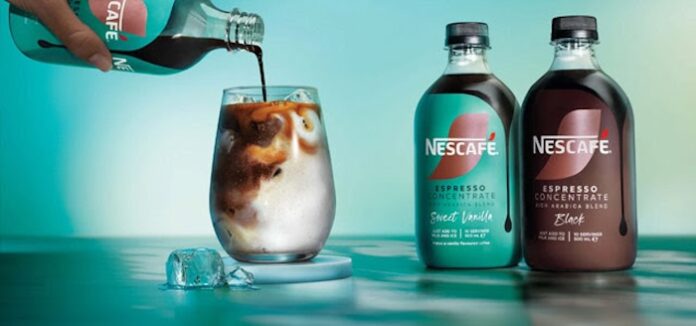To meet the growing demand for cold coffee throughout Asia, Nestlé is increasing the supply of its Nescafé Espresso Concentrate with a new production line at its Sri Muda factory in Malaysia, its first coffee concentrate production line in Asia.
“This investment reflects our ambition to become a leader in the rapidly expanding cold coffee segment, especially among younger consumers, who are looking for premium, café-style experiences, both at home and on the go,” stated Axel Touzet, head of Nestlé’s strategic coffee business unit. “This factory is perfectly positioned to meet the increasing demand for Nescafé Espresso Concentrate in Asia.”
The new production line will serve both domestic and international demand, including in Singapore, Oceania and the MENA region, with potential plans to export into Europe in the future. An important market in Nestlé’s regional supply network, Malaysia is centrally located in Asia, meaning it is close to coffee sourcing locations and can enable faster regional distribution. The teams operating the Sri Muda factory have extensive expertise in liquid manufacturing. Renowned brands, such as Milo and Nescafé, are also produced at this Nestlé facility.
This milestone reflects Nestlé’s long-term commitment to growing in Malaysia, where the company has invested approximately CHF 290 million in the past five years. Looking ahead, Nestlé plans to invest about CHF 150 million in the country by 2028 to further enhance its manufacturing capabilities, digital infrastructure and innovation capacity.
IndiFoodBev — authentic, impactful and influential
An English-language food and beverage processing and packaging industry B2B platform in print and web, IndiFoodBev is in its third year of publication. It is said that the Indian food and beverage industries represent approximately US$ 900 billion in revenues which implies more than 20% of the country’s GDP. Eliminating the wastage on the farmside can help to deliver more protein to a higher number of the population apart from generating sizable exports. The savings in soil, seeds, water, fertilizer, energy and ultimately food and nutrition could be the most immense contribution that country is poised to make to the moderation of climate change.
To improve your marketing and grow sales to the food and beverage processing and packaging industry, talk to us. Our research and consulting company IppStar [www.ippstar.org] can assess your potential and addressable markets in light of the competition. We can discuss marketing, communication, and sales strategies for market entry and growth.
Suppliers and service providers with a strategy and budget for targeted marketing can discuss using our hybrid print, web, video, and social media channels to create brand recognition linked to market relevance. Our technical writers are ready to meet you and your customers for content.
The second largest producer of fruit and vegetables in the world is continuously expanding processing capacities and delivery systems with appropriate innovative technologies. We cover product and consumer trends, nutrition, processing, research, equipment and packaging from farm to thali. Get our 2025 media kit and recalibrate your role in this dynamic market. Enhance your visibility and relevance to existing markets and turn potential customers into conversations. Ask for a sample copy of our bi-monthly in print or our weekly IndiFoodBev eZine each Wednesday.
For editorial info@ippgroup.in — for advertisement ads1@ippgroup.in and for subscriptions subscription@ippgroup.in
Naresh Khanna – 10 February 2025
Subscribe Now











